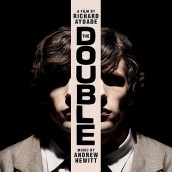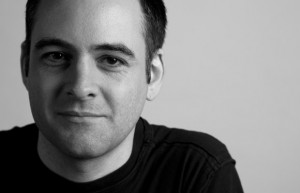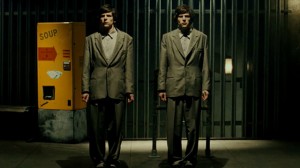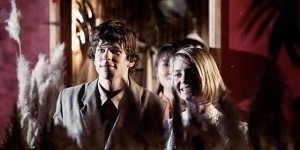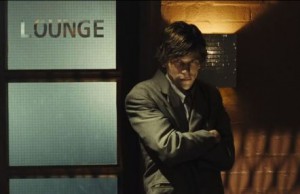Where Russian author Fyodor Dostoevsky’s work might be better known among mainstream moviegoers for history-drenched adaptations of “The Brothers Karamazov” and “Crime and Punishment,” it’s likely that viewers might mistake the new cinematic translation of THE DOUBLE as coming from the pen of Franz Kafka, another pessimism-drenched writer whose characters dealt with oppressive bureaucracies and mind-numbing daily drudgery. It’s a screaming shadow that’s certainly influenced Hollywood when throwing pathetic everyman heroes into the mouths of madness, whether it’s BRAZIL‘s Sam Lowry haplessly dealing with Central Services to poor BARTON FINK facing screenwriting Armageddon in a hotel from hell. But whatever depression-rich part of the Eastern hemisphere these tales might have first stemmed from, there’s something devilishly funny about seeing some poor shmuck trying to wrench his way out of the gears of the system – a task made all the more insane when he’s being shoved into its rusty cogs by his own doppelganger to the tune of an alternately spastic and restrained chamber orchestra, delightfully jumping through musical collages of broken down machines, true, heartfelt tenderness for the piano and hilarious awful synths that wouldn’t have passed old school Dr. Who muster.
Such is the impressively clever and catchy approach of the sore by Andrew Hewitt (THE BRASS TEAPOT) that matches the cult-film to come vision of director Richard Ayoade’s devolved, somewhat sci-fi ish spin on Dostoevsky’s THE DOUBLE. Hewitt’s purposefully lo-fi but greatly inventive score embodies this familiar neo-future crammed with oppressive office machinery, uncaring bosses and beyond-cramped apartments in a way that’s wonderful paranoia to the ears. Having last worked with Ayoade to convey the love struck paranoia of a particularly smart English teen in SUBMARINE, Hewitt once again shows his energetic, classically influenced chops for the two personages of Jesse Eisenberg, here taking his nervous appeal to truly frenzied heights as Simon – a barely audible drone in love with his beautiful co-worker Hannah. But leave it to suave lookalike James to magically appear and make all the right moves, taking Simon under his wing for a seemingly friendly plan for self-improvement whose real end goal is to consume his pathetic, original edition’s life.
Swinging from stridency to sensitivity as gonzo Japanese tunes play for some reason, Hewitt’s nightmarishly entertaining, stripped-down score is literally the rapidly unraveling strings from which Simon’s hapless Pinocchio hangs by a thread. Its strikingly thematic twine is mainly created from minimal rhythms that play the post modernism of Steve Reich and Philip Glass as a twisted, yet catchy melodic Greek chorus whose sharply percussive strings urge THE DOUBLE‘s dweeb to jump. And who wouldn’t when surrounded by the eccentric source music of the goofy commercials, 8-bit computer game music and ultra cheap laser blasting of “The Replicator” show that always seems to be on a corroded TV in the background? Dostoevsky would likely feel right at home with Hewitt’s score that’s at once a classical throwback and the height of post-modernist hipness – a DOUBLE take that resonates with ever-maddening musical invention.
ASSIGNMENT X: Did you immerse yourself in Dostoevsky before taking on the assignment, let alone the music of such modern minimalists as Steve Reich?
ANDREW HEWITT: I read the novel, and found it very disconcerting – which is a great place to start with this film. I have been listening to Steve Reich incessantly since I discovered him while at Cambridge (though he’s not on the syllabus). It was funny discovering Steve Reich after John Adams…but that is often the way!
AX: How did you want the approach of old-world classical composers to collide with modernist ones?
HEWITT: Yes the Schubert was absorbed within the score, and it’s a lovely re-iteration of Simon’s world – time zone confusion!
AX: With your extensive training in classical music, do you think it’s a sound you naturally gravitate to? And how did playing in the orchestras for movies like HARRY POTTER and THE LOR D OF THE RINGS help your technique as a solo composer?
HEWITT: Yes the classical background is a sensibility that is my own, and the experiences singing in scores such as STAR WARS and LORD OF THE RINGS inspired me to make my dreams a reality.
AX: Did the technologically stripped-down look of the movie lead to your “chamber” approach for the score?
HEWITT: The score took on the character of Simon – whose world reflects him, rather than the other way round. So the score is everything: it’s electronic, orchestral, chamber, all at the same time – to reflect all the aspects of his world.
AX: How important was the blend between humor, and seriousness to your score?
HEWITT: The seriousness of the score was vital, and never in any discussion or doubt, as any comedy or comic character is only really funny if it takes itself seriously.
AX: Do you see any musical, and cinematic similarities between SUBMARINE and THE DOUBLE? And how did your collaboration differ, or remain the same for this film?
HEWITT: The similarities, in Richard’s filmmaking approach, which is something I can have access to when needed, is that it is a variety of postmodernism, embracing the ‘use’ of style, for dramatic purposes – referencing things is something he and I ‘get’ how to do, I would say. I think Richard is a deeply thoughtful filmmaker, who is seeking more and more opportunities to express a fundamentally cinematic sensibility.
AX: One could describe THE DOUBLE as BRAZIL meeting the frenzy of BARTON FINK. How did the fin’s look, and intimacy influence your score? And were there any other scores from similarly paranoid films that made an impression on your approach?
HEWITT: I didn’t’ refer to any scores, nor did Richard, because we started scoring during his scriptwriting stage, which is what we always do, and that became his temp, and he played it on set, etc. The intimacy was inbuilt from the beginning – it’s part of the essence of “The Double.”
AX: There’s a time-warped sensibility to THE DOUBLE that makes the film take place in realm that could be the past, or the future. Do you think the score’s classical approach was a good way to anchor that atmosphere?
HEWITT: The score embraces electronic, orchestral, and chamber sections, and in this way at each moment embraces what needs to be embraced – moving between the different areas of Simon’s world, in the way also that his mind moves between the things that preoccupy him so much, and so obsessively.
AX: You wrote a good deal of THE DOUBLE before the film was made. Does it help to have the music played back on the set in terms of the actors’ performances? And once the movie was done, how did your approach change?
HEWITT: I was so honored that Richard played it on set, and Jesse I know loves the score very much. I know that once I started to see rushes, cues like “The Switch” could emerge, because they were more directly timed to picture and ‘moments’, rather than the landscape cues, like “I am a Ghost,” which were written to reflect character initially.
AX: In the album’s liner notes, Jesse Eisenberg remarks that you’re the first composer he’s ever met on a set. Was the experience at all unusual for you?
HEWITT: It was so wonderful discussing the character with Jesse. The time on set was very inspiring, and I do that with every project – to soak up the world of the film.
AX: A good deal of the audience might be confused by what is, and what isn’t actually happening in THE DOUBLE, especially in its conclusion. How important was it for you to have an inner sense of musical logic as to what was going on. And were you left with your own questions about what you were scoring?
HEWITT: A film like THE DOUBLE is scored according to the narrative, and its motions and processes, rather than by a method of telling the audience what is happening. For a blockbuster thriller, one takes a different approach, because that’s what’s needed. But here there are meant to be questions unanswered. I remember discussing my own theory of the ending with Richard – he nodded politely.
AX: Could you talk about your sound collage approach for cues like “Mr. Papadopoulos?”
HEWITT: This cue came about because I had an idea very early on that the workplace could be scored using sounds from outmoded electronic devices, such as faxes, modems, and loud inkjet printers, etc.
AX: Did you ever want the score to reflect the good vs. evil of Simon vs. James? And how would you describe each other’s themes?
HEWITT: The score was intended to reflect the inner paranoia and awful refraction of Simon’s mind…how it splits, into James. It’s really a painful thing. It’s the life of a psychotic – everything is on the surface, and nothing is hidden – it’s really quite frightening, and the aim was to lay everything bare – so the processes of the music are utterly on the surface, visible. That’s why the Steve Reich “American post minimalism” is so perfect – as Reich says, that kind of music is about all the processes being surface-visible: like watching an hourglass as every grain of sand falls.
AX: With Simon barely able to talk, was it all the more important for your score to emote for him? Or did you want to add to the frustration of his inability to express himself?
HEWITT: The score often came in after his mute moments…reflecting the emotions he felt during those moments of speechlessness.
AX: How important was it to give a straightforward sense of emotion to Hannah’s character?
HEWITT: It was such a lovely contrast, writing her material – it is the thing that calms Simon, that gives him respite in the world.
AX: Did you have a game plan as to how to musically chart Simon’s gradual breakdown in the face of his doppelgänger?
HEWITT: This emerged in our formation of the score, before and during editing, and works all the way up to that incredibly powerful moment in the Ambulance…as his life seems to slip away.
AX: There are some truly absurdist song choices in THE DOUBLE from country to Japanese tunes. How do you think they ironically contrast with your score?
HEWITT: The song choices by Richard are simply marvelous. They are part and parcel of the free-ranging stylistic, de-centered approach that reflects the fractured nature of Simon’s inner mental life.
AX: A show that keeps appearing in THE DOUBLE is “The Replicator,” for which you’ve written could be described as the worst, and most hilarious approximation of bad British TV sci-fi scoring. Was it hard to reach that level of synth cheesiness?
HEWITT: That was such a lot of fun! I can’t wait for the whole Replicator series – that would be a whole lot of pleasure to score!
AX: The “source” cues within THE DOUBLE are equally as fun in achieving a lo-fi sound. Could you talk about writing them?
HEWITT: The sound was very important, in terms of treating the original sound sources, and the sound mixer Nigel Heath is the master at this – Richard met him on the video for DARKPLACE ILLUMINATUM ten years ago, and I know that he comes back to Nigel for everything he needs in this realm.
AX: You’ll next be dealing between future shock and classical dramedy with your scores for NARCOPOLIS and BILL. What can you tell us about them?
HEWITT: NARCOPOLIS is a thriller set in the future, which I scored in a classical sci-fi manner: Vangelis-like synths and big electronic leads – I had it mixed by the score mixer of GRAVITY, Gareth Cousins – and it sounds just fantastic. BILL will be a wonderful throwback to the 1950s lush romantic full orchestral scoring that was reinitiated by STAR WARS and THE OMEN in the late 70s. It’s a joy to be doing, and it’s going to be very, very funny.
AX: Who would you rather hang out with – Simon or James? And if you ever met your musical, and physical doppelgänger, what do you think he’d be expressing that you haven’t been able to so far?
HEWITT: I think the myth is that if you meet your doppel, you die. So I don’t really want to! And I love Simon’s character far more than James – which is what we’re supposed to, I guess – Simon is honest and true to his feelings – while it seems that James is a pushy faker, happily lying to those around him, just to get what he wants – Simon, to me, is the most honest character in the whole movie, and wonderfully so.
AX: Do you think that composing is a paranoid occupation?
HEWITT: No, I’ve never thought that!
THE DOUBLE is now in theaters and on VOD, with Andrew Hewitt’s score available on Milan Records HERE
Visit Andrew Hewitt’s website HERE
AGREE? DISAGREE? LET YOUR VOICE BE HEARD – COMMENT BELOW
Related:More ASSIGNMENT X soundtrack reviews
Follow us on Twitter at ASSIGNMENT X
Fan us on Facebook at ASSIGNMENTX
Article Source: Assignment X
Article:Interview with DOUBLE composer Andrew Hewitt
Related Posts:




